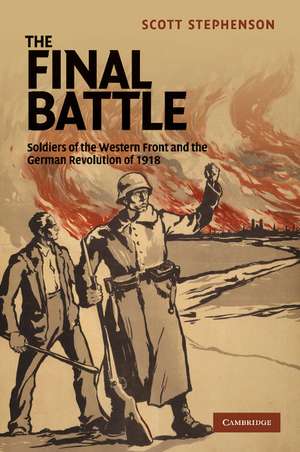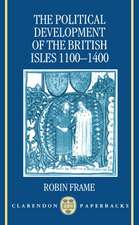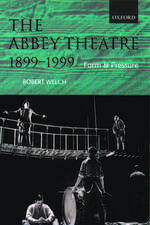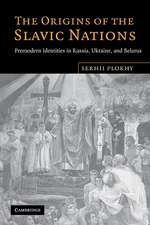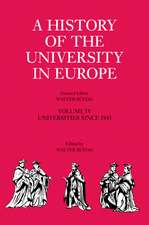The Final Battle: Soldiers of the Western Front and the German Revolution of 1918: Studies in the Social and Cultural History of Modern Warfare, cartea 30
Autor Scott Stephensonen Limba Engleză Paperback – 21 aug 2013
| Toate formatele și edițiile | Preț | Express |
|---|---|---|
| Paperback (1) | 271.98 lei 6-8 săpt. | |
| Cambridge University Press – 21 aug 2013 | 271.98 lei 6-8 săpt. | |
| Hardback (1) | 759.18 lei 6-8 săpt. | |
| Cambridge University Press – 26 aug 2009 | 759.18 lei 6-8 săpt. |
Din seria Studies in the Social and Cultural History of Modern Warfare
-
 Preț: 325.91 lei
Preț: 325.91 lei -
 Preț: 275.66 lei
Preț: 275.66 lei -
 Preț: 203.42 lei
Preț: 203.42 lei -
 Preț: 199.05 lei
Preț: 199.05 lei -
 Preț: 231.63 lei
Preț: 231.63 lei -
 Preț: 202.90 lei
Preț: 202.90 lei -
 Preț: 279.96 lei
Preț: 279.96 lei -
 Preț: 205.41 lei
Preț: 205.41 lei -
 Preț: 178.15 lei
Preț: 178.15 lei -
 Preț: 188.94 lei
Preț: 188.94 lei -
 Preț: 278.72 lei
Preț: 278.72 lei -
 Preț: 345.73 lei
Preț: 345.73 lei -
 Preț: 200.35 lei
Preț: 200.35 lei -
 Preț: 156.72 lei
Preț: 156.72 lei -
 Preț: 232.44 lei
Preț: 232.44 lei -
 Preț: 313.34 lei
Preț: 313.34 lei - 9%
 Preț: 627.66 lei
Preț: 627.66 lei -
 Preț: 275.66 lei
Preț: 275.66 lei -
 Preț: 284.17 lei
Preț: 284.17 lei - 11%
 Preț: 585.45 lei
Preț: 585.45 lei - 11%
 Preț: 699.86 lei
Preț: 699.86 lei -
 Preț: 230.49 lei
Preț: 230.49 lei -
 Preț: 285.37 lei
Preț: 285.37 lei -
 Preț: 274.88 lei
Preț: 274.88 lei -
 Preț: 222.33 lei
Preț: 222.33 lei - 11%
 Preț: 586.47 lei
Preț: 586.47 lei - 11%
 Preț: 582.88 lei
Preț: 582.88 lei - 8%
 Preț: 530.55 lei
Preț: 530.55 lei - 11%
 Preț: 587.49 lei
Preț: 587.49 lei -
 Preț: 282.26 lei
Preț: 282.26 lei -
 Preț: 287.28 lei
Preț: 287.28 lei -
 Preț: 285.37 lei
Preț: 285.37 lei -
 Preț: 285.75 lei
Preț: 285.75 lei -
 Preț: 285.37 lei
Preț: 285.37 lei -
 Preț: 206.77 lei
Preț: 206.77 lei -
 Preț: 178.78 lei
Preț: 178.78 lei - 11%
 Preț: 642.35 lei
Preț: 642.35 lei
Preț: 271.98 lei
Nou
Puncte Express: 408
Preț estimativ în valută:
52.05€ • 55.65$ • 43.39£
52.05€ • 55.65$ • 43.39£
Carte tipărită la comandă
Livrare economică 18 aprilie-02 mai
Preluare comenzi: 021 569.72.76
Specificații
ISBN-13: 9781107632363
ISBN-10: 1107632366
Pagini: 374
Ilustrații: 30 b/w illus. 4 maps
Dimensiuni: 152 x 229 x 20 mm
Greutate: 0.5 kg
Editura: Cambridge University Press
Colecția Cambridge University Press
Seria Studies in the Social and Cultural History of Modern Warfare
Locul publicării:New York, United States
ISBN-10: 1107632366
Pagini: 374
Ilustrații: 30 b/w illus. 4 maps
Dimensiuni: 152 x 229 x 20 mm
Greutate: 0.5 kg
Editura: Cambridge University Press
Colecția Cambridge University Press
Seria Studies in the Social and Cultural History of Modern Warfare
Locul publicării:New York, United States
Cuprins
Preface; 1. The divided army; 2. The last ditch: German front-line soldiers in the last days of the First World War; 3. Caesar without legions: the field army and the abdication of the Kaiser, November 8–9, 1918; 4. Legions without Caesar: the German army's response to armistice and revolution, November 9–14, 1918; 5. The last march: the German Westheer's march to the Rhine, November–December, 1918; 6. Dissolution and conspiracy: the army's homecoming and demobilization, December 1918; 7. The last parade: the Guards return to Berlin, December 10–22, 1918; 8. The last battle: 'Bloody Christmas,' December 23–24, 1918; 9. From debacle to civil war: the aftermath of 'Bloody Christmas,' December 1918–January 1919; 10. Conclusion: Frontschweine and revolution.
Recenzii
Review of the hardback: 'Scholars will find much to engage with in this powerful book. Stephenson's descriptions of the German retreat following 11 November and his analysis of the soldiers' councils are among the book's strengths. His investigation of the conduct of German soldiers has implications beyond the rather unusual environment of 1918 and will speak to those interested in the behavior of veterans of all wars. The Final Battle is a worthy contribution to Cambridge University Press's prestigious Studies in the Social and Cultural History of Modern Warfare series and a valuable addition to our understanding of the critical year of 1918.' Michael Neiberg, Michigan War Studies Review
Review of the hardback: '… a moving and often brilliant book that should serve as a model for the so-called 'new military history'.' Parameters
Review of the hardback: 'No historian of the Imperial army or the Weimar Republic can afford to ignore this thought-provoking and, in many ways, provocative study.' English Historical Review
Review of the hardback: 'This well crafted and thoroughly researched monograph is the first in many years to explore the return home of the defeated Imperial Army.' Stand To! The Journal of the Western Front Association
Review of the hardback: '… a moving and often brilliant book that should serve as a model for the so-called 'new military history'.' Parameters
Review of the hardback: 'No historian of the Imperial army or the Weimar Republic can afford to ignore this thought-provoking and, in many ways, provocative study.' English Historical Review
Review of the hardback: 'This well crafted and thoroughly researched monograph is the first in many years to explore the return home of the defeated Imperial Army.' Stand To! The Journal of the Western Front Association
Notă biografică
Descriere
A study of the army's role in the early German republic and its legacy for Weimar and Nazism.
